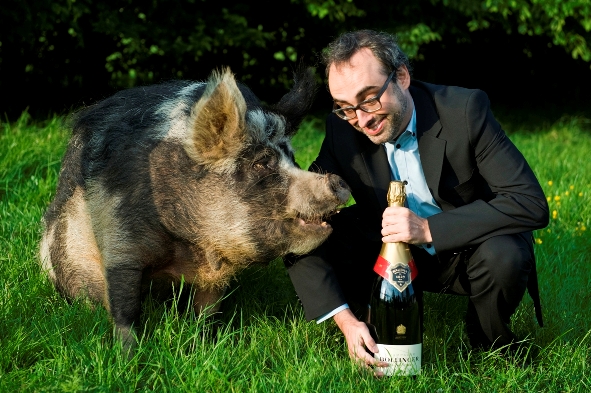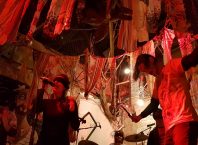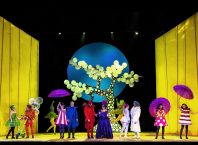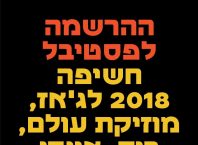
Even quiet, bookish types like to get all excited sometimes – at least every other year when the International Writers Festival brings a bevy of celebrated authors to Mishkenot Sha’ananim in Jerusalem. The 3rd International Writers Festival will take place from May 13 – 18, 2012; a wonderful chance to hear favorite authors in readings, seminars, interviews and discussions on writing, literature and culture.
Howard Jacobson (USA) – 2010 Man Booker Prize for his novel The Finkler Question; Vikas Swarup – Q & A, the novel that was the basis for the 2008 film Slumdog Millionaire; Tracy Chevalier (UK) – Girl with a Pear Earring; Gary Shteyngart (USA) – Super Sad True Love Story, winner of the 2010 Bollinger Everyman Wodehouse Prize for comic literature; Gerard Donovan (Ireland) – Julius Winsome (2006), Lorenza Mazzetti (Italy) – The Sky Falls; Claudia Piñeiro (Argentina) – Widows of Thursdays; Aimee Bender (USA) – An Invisible Sign of My Own; Tom Rob Smith (UK) – Child 44; Herman Koch (Netherlands) – The Dinner; Arnon Grunberg (Netherlands) – Blue Mondays; László Krasznahorka (Hungary) – War and War; Solveig Eggerz (Iceland) – Seal Woman; and Boualem Sansal (Algeria) – The German Mujahid; are the international authors who have already confirmed their participation in the festival.
Israeli authors who confirmed their attendance include: David Grossman, A. B. Yehoshua, Eli Amir, Meir Shalev, Eshkol Nevo, Etgar Keret, Zruya Shalev, Yochi Brandes, Dorit Ravinian, Alon Hilu, Nir Baram, Hagai Linik, Matan Hermoni, Moshe Sakal, Yael Neeman, Einat Yakir, and Yair Asulin.
Special events at the festival will include theatre and music performances as well as screenings of film adaptations to novels, followed by a discussion with the authors. A children’s activity area will be set up near the windmill, book signings will take place at the bookstore, and a literary café will complete the festive scene.
The complete festival program is available online in English.
Uri Dromi is the Director of Mishkenot Sha’ananim, and the Festival Director is Tal Kramer, Program Director of Mishkenot Sha’ananim. The festival is produced by the Program Department of Mishkenot Sha’ananim, under the artistic direction of Tal Kramer and Tzila Hayun, CEO of Hotam. The International Writers Festival is made possible through the support of the Jerusalem Foundation, the Jerusalem Season of Culture, Mifal HaPayis, the Culture Administration and other organizations.






“A culture, a people, viewed from a distance, may appear monolithic, homogenous. When one comes closer, one can see that there are a multitude of voices and opinions in this community.”
I couldn’t agree more with Ayelet’s sentiment. Cultural boycotts cause further damage and increase distances between peoples. As Eli Amir said ” ‘How can there be peace without us knowing each other?”
http://www.maannews.net/eng/ViewDetails.aspx?ID=479149
This is a link to an article in events that certainly require ‘dialogue,’ though I very much doubt that poets will be able to supply quite the right script. Writers who bolster a government which arranges for these things to happen should be ashamed of themselves – or have we, they, lost all moral conscience?
Ayetel – It is not possible to effect any kind of dialogue while injustices, nay, serious crimes are being committed by one people upon another. Very often culture itself becomes a tool of propaganda. Dialogue is for people who have time and space in which to talk: the Palestinians have neither.
Thank you for responding to my comment. When I use the word “dialogue” I do not refer to text or speech created for the purpose of promoting an agenda, I am talking about the encounter that can take place between people, who may have crucial differences between them, yet choose to meet and discuss those differences, to be open to hearing another person’s point of view, to see the other as a person with thoughts and feelings, rather than “the enemy.” A culture, a people, viewed from a distance, may appear monolithic, homogenous. When one comes closer, one can see that there are a multitude of voices and opinions in this community. I feel that cultural boycotts serve to reinforce the those voices in the community who view the world as “us” and “them,” perpetuating the feeling that “everyone is against us and we have to defend ourselves constantly.” If I engage in dialogue with you, it is not only to convince you that I am right, it is because I am interested in hearing your views and your critique of my views. Perhaps our conversation will change me in some way, perhaps in some way it will change you.
Ayelet – for all of this, one lives with one’s conscience. The ‘dialogue’ argument is disingenuous, though often used in the present context. Are illegal settlements ‘dialogue?’Is the arresting of Palestinian children, and their jailing,’dialogue?’ Are Palestinian writers taking part in this conference? Let’s understand what dialogue is not: it is not a poem or a novel produced to try to cosmeticise through culture Israel’s crimes against the Palestinians. Ireland should not be complicit in this. Many of us have decided not to be complicit. I am disappointed that this particular writer has decided to attend the festival and refused queries as to why he is going.
As a writer, and I assume – someone who supports dialogue as a means for conflict resolution, I do not understand how you can think that a cultural boycott will further peace. I think that people need to talk to one another, and get to know one another as human beings rather than distant enemy-objects.
I am personally disappointed, as an Irish writer, to see that an Irish novelist has taken up the invitation to attend this festival.
Comments are closed.